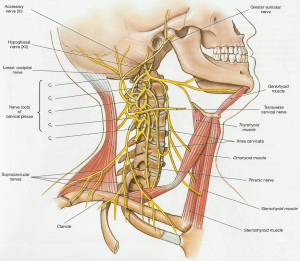Neck pain is a common issue that affects many individuals. It can result from a variety of causes such as poor posture, injury from activity, stress, or trauma. In this blog, we’ll explore the common causes of neck pain and how Physiotherapy can provide effective relief.
Anatomy

The neck is a complex and at times sensitive structure made up of vertebrae (bones), muscles, nerves, and other tissues. The above picture provides a glimpse at some, but certainly not all, of the structures in the cervical region.
To add another layer of complexity, the major nerves that supply the arm, hand and fingers originate from the neck. It is quite often the case that an issue in the neck may be contributing to pain down the arm or at the elbow, wrist and hand.
Pain and dysfunction of the upper neck region is often associated with headaches.
Common causes of neck pain
1. Poor posture: We have probably all heard this, but mobile devices and screens are a major cause of neck pain. This is particularly the case for younger people who seem to spend hours with their head hovering over their phone. This forward head posture can lead to over strain in the neck muscles and ongoing pain.

2. Injuries: Whiplash from car accidents, concussion incidents, or falls can cause significant neck pain. Such injuries can result in traumatic strain to the deep neck muscles and this can lead to an ongoing sense of pain or instability in the neck.
3. Muscle strain: Overuse of neck muscles, whether from heavy lifting or awkward sleeping positions, can result in muscle fatigue and pain.
4. Degenerative conditions: Conditions like osteoarthritis or cervical disc degeneration can also contribute to chronic neck pain, often leading to stiffness and reduced mobility.
5. Stress and tension: Emotional stress can manifest physically in all parts of the body, particularly in the neck and upper shoulder region.
What can I expect from a physiotherapy appointment for my neck pain?
Firstly you can expect a thorough assessment to help identify the cause or causes of your neck pain. This will involve
- Interview – I’ll start by asking questions to determine what factors may have led to the onset of your neck pain. These questions may be straight forward, however if there are other related symptoms such as headache, arm pain, dizziness etc I may need to delve deeper with my questions
- Movement assessment – This is where I work to determine which movements your neck will and will not tolerate. I will also use the movement assessment to identify if there are aspects of muscular strength and coordination that may be contributing to your pain.
- Functional assessment – This is where I try to determine what tasks you are able to complete with no or little risk as well as the ones that you should avoid.
- Palpatory assessment – This is where I use my hands to try and find the origin of your pain.
How can physiotherapy help with my neck pain?
- Manual therapy: Techniques such as mobilisation and soft tissue massage can help alleviate pain and improve mobility by directly addressing joint and soft tissue dysfunction. During manual therapy treatment you can expect that our Physiotherapist will ask for feedback from you regularly to ensure that the treatment is safe and effective.
- Exercise therapy: Strengthening and stretching exercises can improve flexibility, strengthen neck muscles, and promote better posture, ultimately reducing the likelihood of future pain.
- Specific retraining and strengthening of the deep flexor muscles of the neck may be required if there is a history of whiplash or concussion. This is something that our Colac Physiotherapist will be able to identify and treat if required.
- Education and ergonomics: Our Colac Physiotherapist will provide guidance on proper ergonomics, for example education on how to set up your computer desk station to prevent further strain on your neck.
- Pain management techniques: Physiotherapists employ various modalities such as electrical stimulation and hot/cold therapy to reduce pain and inflammation.
- Stress management: Techniques such as relaxation exercises, breathing strategies, and mindfulness may be useful in helping to reduce stress related to your neck pain.
Don’t let neck pain interfere with work, leisure, sleep or your movement goals. Make an appointment with our experienced, Colac Physiotherapist, Grant Brauer by contacting us at Prosper Health Group Colac on (03) 5290 5238. Alternatively you can book online at here.
